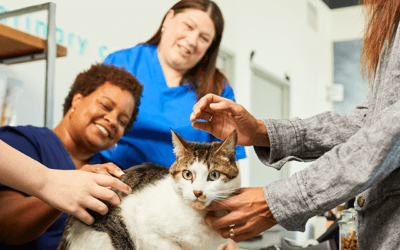Ready for some hard truth? According to an American Animal Hospital Association survey, 86% of employees had stolen from their veterinary clinic. While theft is a blatantly clear form of fraud, not all fraud is that obvious. You might be flirting with fraud right now and not even know it.
Fear not, below you’ll find a list of financial tips to keep you and your practice on the right side of the law. I’ll also share a personal example of the fraud I uncovered with my forensic accounting skills so that you know what to look for. Keep calm and read on.
What does flirting with fraud mean?
According to Merriam-Webster:
flirting |
fraud |
| [flərt] verb To come close to reaching or experiencing something — used with with. |
[frȯd] noun Intentional perversion of truth in order to induce another to part with something of value or to surrender a legal right, or an act of deceiving or misrepresenting. |
It’s all about knowing what the line between legal and fraudulent is and minding the gap. The law isn’t necessarily concerned with whether you knew you were engaging in fraud, it simply cares whether a law has been broken.
So, the best thing you can do to avoid fraud is to educate yourself, your staff, and then implement checks and balances.
Top 5 tips to avoid flirting with fraud
- Enforce strict change rules
The need to change a transaction after a client leaves does pop up from time to time. However, these changes need to be handled properly. Document the reason for the change and take as detailed notes as possible. You can also password-protect these functions so that only practice owners can initiate adjustments. - Monitor inventory
It’s truly a shame how product tends to walk out the door when inventory isn’t properly managed. Prescription drugs, pet food, and especially flea, tick, and heartworm products need to be diligently monitored and counted monthly, if not biweekly. Keep a good record of this and make your staff aware that this is being done. You can even take it a step further and assign this job to a new person each month. This will surely keep everyone honest and on their toes. - Monitor promotions and coupon use
Staff members will sometimes abuse coupons and promotions to their personal benefit. Monitor for this and be clear to your employees what is and isn’t acceptable. Remind staff members of their employee discount and the fact that most food companies already offer staff discount programs. - Reconcile accounts
Can’t stress enough how important it is to reconcile your accounts, both internally and externally. For example, monthly laboratory invoices should be reconciled to monitor staff usage and to make sure the lab is staying true to their special pricing. When your books don’t add up, you know you’ve got a problem. - Limit company credit
It’s best practice to not allow employees to invoice themselves or pay their account alone. It’s also important to limit employee balances to a specific dollar amount. Be sure to have your employees sign a document stating that the hospital is authorized to take any remaining balance on their account out of their last paycheck.
It could happen to you — forensic accounting uncovers fraud
Here’s a personal example to help illustrate the importance of fraud prevention.
Since I have a background in forensic accounting, my employer asked me to look into theft at our practice. I began by first looking at personal employee accounts in the practice management software in order to narrow down who to investigate.
Red flags included:
- Employees who have entered their own charges
- Prices that had been discounted above regularly given discounts (Every practice management software has a report for deleted or changed invoices.)
- Employees whose pets are on prescription diets but they aren’t purchasing them from the practice. (Yes, there are online pharmacies and other options, but the employee discount usually makes them cheaper to get in clinic.)
Second, I looked at employee lifestyles to see if anyone was clearly living outside their means. This included estimating spousal salaries. The key to finding an inside thief is to know your staff personally.
Red flags included:
- Expensive designer purses
- Expensive vacations
- Expensive cars
Once I had an idea of who might actually be skimming from the hospital, I then looked into every account that the employee had access to picking them apart.
At the end of the investigation, I found one employee who was stealing on a daily basis, equaling roughly $30,000 a year in cash and supplies. Sadly, it was the practice manager of 14 years who was stealing for at least 9 years that I could confirm.
I informed the owner and highlighted the biggest problem: there were no checks and balances. The practice manager had all access to everything with zero accountability. This all could have been avoided simply by doing inventory, monitoring reporting, and implementing checks and balances.
Fraud Prevention
So, is your practice flirting with fraud or do you run a tight ship? Be sure to implement the top 5 tips above and reduce your risk today. And use the VetSuccess Practice Overview Report to stay on top of all your critical KPIs.
Amber has 16 years of experience as a Veterinary Technician, working with large animals, small animals, pocket pets, and exotics. Beyond her love for animals, Amber also has a passion for numbers and a background in forensic accounting. She went to Arkansas State University to get her Associates in Business and she interned at a CPA office before making her way to VetSuccess as a Customer Support Specialist.



